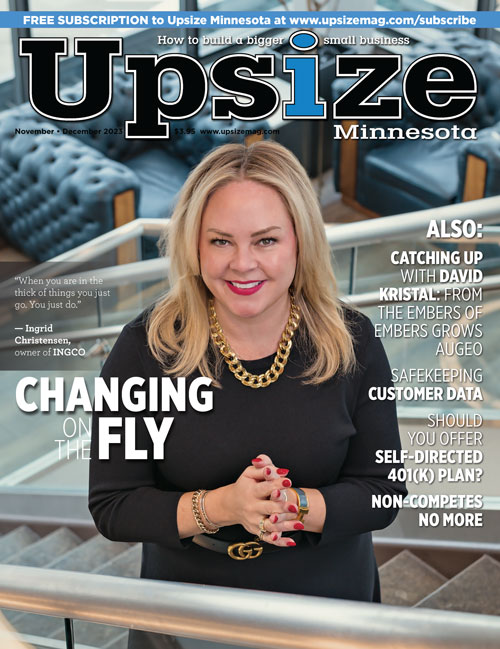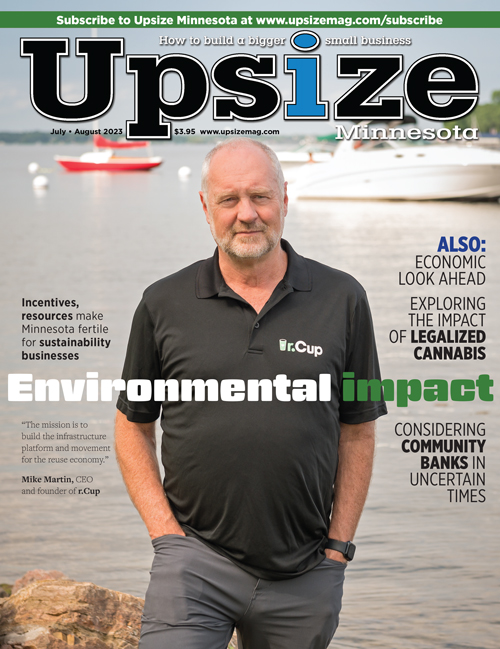
Cover Story
Nomad's journey
Nick Smaby was always a restless seeker. To the outside world, he may have looked like a nomad who couldn?t make up his mind about what to do with his life. The earliest entries on his resume did not immediately suggest that he was destined for success in business.
Armed with a psychology degree from Dartmouth College, Smaby earned a law degree from the University of Wisconsin in 1975, but had no love for the legal profession.
?I hated the practice of law. I did it for about a year and realized it was not the calling for me,? says Smaby. ?So I quit with some vague dreams about someday becoming a writer.?
Smaby moved to Manhattan and pondered writing the Great American Novel. ?I lived like a writer, I thought like a writer, I did everything but write,? he says with a laugh. ?I rather quickly became broke.?
He returned to his native Minneapolis and found a job at B. Dalton while entertaining schemes of opening his own bookstore. He and a partner opened Donegal Bay, a bookstore and art gallery in St. Louis Park in 1979. Smaby recalls working seven days a week for two years, scrapping and scraping to make a buck, before selling his interest in the bookstore.
Between careers and without a plan, Smaby fell into his next line of work. ?A friend of mine was building his own hoand asked me if I wanted to help him,? says Smaby. ?I said, ?Why not?? ? Smaby strapped on a tool belt and began to learn the fundamentals of carpentry.
He soon discovered that he enjoyed the work. ?I was absolutely without any training whatsoever, but realized very quickly that it felt good to be building things. It seemed healthy,? says Smaby. ?And there?s tremendous satisfaction at the end of the day, being able to look at what you?ve accomplished.? Continue reading →
Letter From the Editor
Get dirty
Growing a company is a calling for many people. Nick Smaby, president of Choice Wood Products, found his calling after years of searching.
He was a writer who didn?t write much for a while, then toyed with the idea of his own book store, he tells Burl Gilyard in this month?s cover story. A detour into carpentry eventually led him to Choice Wood, a home remodeling company that initially had little success. The bad times made it easy for Smaby to buy a stake ? partners were looking for the equity infusion when cash came up short.
Then in 1989 Smaby got a new partner with a sharp eye for finances. The two revamped the company completely and started again. This time they and other new partners have built it into a $16 million home-building and remodeling concern with multiple business lines and clients among the Twin Cities? toniest. Continue reading →
Back Page
Back page
Michael Coles arrived in Minneapolis from Atlanta in mid-January as CEO of Caribou Coffee, hand-picked by its major investor, Crescent Capital, to jump-start the chain?s growth plans. The chain has grown to 210 stores since John and Kimberly Puckett started it with a northwoods theme in the 1990s, but hasn?t had enough success outside of the region to satisfy financiers.
Coles knows something about growth. He started the Great American Cookie Co. in the 1970s, building the franchised operation to more than $100 million in sales before selling in 1998 to finance an unsuccessful run at the U.S. Senate. Before he was tempted to scratch the political itch again, he says, he took on the challenge of building Caribou Coffee. Continue reading →
Focus
Financial guide: Paradise lost
Once, not so long ago, this land was filled with angel investors, ready to open up their wings, share their wealth and help small businesses of all varieties soar.
And if it wasn?t an angel with a fat wallet or purse, it was a group of saints ? venture capitalists who proclaimed to anyone listening they had money to give. The possibilities were endless and the opportunities plentiful.
Now the angels are in hiding. The saints are hoarding the collection plates. And paradise has given way to an economic downturn, less available capital, stingier bank loans, equity markets in turmoil. Continue reading →
Financial guide: Choose your partner
"We need help. We need money. We need a strategic partner."
That''s been a mantra of sorts over the past year for Minnetonka-based LecTec Corp, a medical products manufacturer that has seen the effects of a softening industry, an economic downturn and less demand from customers.
The result: a significant drop in revenue and a loss of cash that was once planned for expansion. The company has felt the immediate pressure to hunt for financial solutions. In LecTec''s case, that means finding a strategic partner. Continue reading →
Q&A: Getting there
John Kimball is a newcomer to Minnesota, having become Associated Bank?s CEO for the state last April after several acquisitions by the Michigan-based bank holding company. He?s an old hand, though, at talking to business owners to get a read on the economy, and to figure out what it takes to survive.
Upsize talked with Kimball to get his take on a slightly recovering economy, and to share his advice about stretching cash resources until things improve. He says now is an inexpensive time to expand. Continue reading →
Financial guide: Something different
Business owners often spend so much time trying to raise money through standard channels that they miss easy opportunities. Here are alternative funding you might not have considered.
One of the largest sources of funding is community funds and neighborhood development programs. While many of these groups focus on helping minority business owners get started, officials say there is money for everyone.
?The whole point of these programs is to help you and your business grow. That?s what we?re here for,? says Mara O?Neill, chief operating officer of the Neighborhood Development Center, one of the area?s larger community groups. ?We work closely with the business to get it started and help give them that extra financial push to grow.? Continue reading →
Select benefits
When Gary Wert founded Minnetonka-based Unison Inc. in 1980, employer-sponsored health-care packages cost individuals as little as $34 a month and families about $100 per month, says Wert.
Oh, how times have changed. A recent survey of 75 Twin Cities companies between 50 and 500 employees by Unison, which helps small to mid-sized businesses design and implement health and retirement plans, showed that the average health-care premium for employees is about $50 for individuals and $250 for family. Wert says it?s not uncommon to see plans that cost individuals as mush as $300 per month and families up to $1,000 to $,1,500 per month. Continue reading →
Business Builders
Business valuations
Business owners often question the value of business valuation. And for good reason. Their view is that business valuation does nothing more than establish a questionable number, as of a date in the past, with no relevance to the future, at a cost of many thousands of dollars. That combination does not push business valuation to the top of one's list. Continue reading →
SIMPLE plan
Small-business owners know that talented and qualified employees expect benefits in addition to a competitive wage. This presents a challenge, particularly in the area of retirement benefits.
Until recently, retirement plan options were often complex and costly to maintain. But rest easy. With the added option and enhancement of the SIMPLE plan in recent tax legislation, there is now a retirement plan available that is cost-effective and easy to implement for the employer, while also being attractive to employees.
The Savings Incentive Match Plan for Employees (SIMPLE) provides employees with an opportunity to contribute to their own retirement funding through elective deferrals, with an added employer-matched contribution. Sound like a 401(k)? Not quite. It?s similar, but without the added administration, testing and annual filing requirements that an employer is required to maintain with a 401(k). Continue reading →
Issues in a lease
Contracts are made up of two fundamental elements. In real estate, those are lease rates, or price, and lease provisions, or terms. A common mistake people make is focusing solely on the price of a lease, foolishly overlooking the intrinsic value of favorable lease terms. Price and cost are two completely different things. Continue reading →
Ad campaign legal checklist
If you?re one of those people who watch the Super Bowl for the commercials rather than the game, you understand the power of a good advertisement.
But when you launch an advertising campaign, your competitors are watching, too. So are government regulators like the Federal Trade Commission and state attorney general and consumer watchdogs like the Better Business Bureau. If you make a mistake in your ads, the damages can be steep, both in financial terms and in the blow to your reputation. Continue reading →



